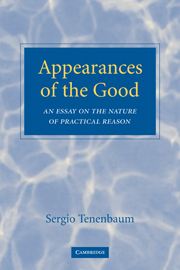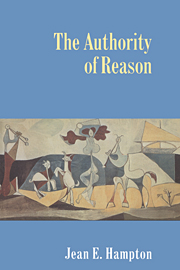Appearances of the Good
'We desire all and only those things we conceive to be good; we avoid what we conceive to be bad.' This slogan was once the standard view of the relationship between desire or motivation and rational evaluation. Many critics have rejected this scholastic formula as either trivial or wrong. It appears to be trivial if we just define the good as 'what we want', and wrong if we consider apparent conflicts between what we seem to want and what we seem to think is good. In Appearances of the Good, Sergio Tenenbaum argues that the old slogan is both significant and right, even in cases of apparent conflict between our desires and our evaluative judgements. Maintaining that the good is the formal end of practical inquiry in much the same way as truth is the formal end of theoretical inquiry, he provides a fully unified account of motivation and evaluation.
- A new account of practical reason and intentional explanations
- Explains evaluative attitudes in terms of motivational attitudes
- Offers a new interpretation of phenomena such as Akrasia and Accidie
Product details
August 2007Adobe eBook Reader
9780511292217
0 pages
0kg
This ISBN is for an eBook version which is distributed on our behalf by a third party.
Table of Contents
- 1. The basic framework: desires as appearances
- 2. The basic framework: from desire to value and action
- 3. The subjective nature of practical reason
- 4. The objective nature of practical reason
- 5. Deontological goods
- 6. Motivation without evaluation? Unintelligible ends, animal behaviour, and diabolical wills
- 7. Evaluation and motivation part company? The problem of Akrasia
- 8. Evaluation and motivation part company? The problem of Accidie.





